2022
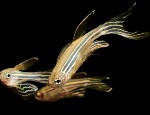 Zebrafish testing identifies a gene potentially at the root of domestication
Zebrafish testing identifies a gene potentially at the root of domestication3 January 2023
Researchers at Queen Mary University of London have shown that zebrafish can provide genetic baz1b clues to the evolution of social behaviours in humans and domesticated species.
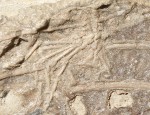 British scientist describes rare discovery of a dinosaur eating a mammal
British scientist describes rare discovery of a dinosaur eating a mammal21 December 2022
The small, feathered dinosaur Microraptor is preserved with the foot of a small mammal inside its ribcage.
 New Sky Arts film features Queen Mary culture expertise
New Sky Arts film features Queen Mary culture expertise20 December 2022
Following this summer’s hit Wonderland series, Sky TV has created a Christmas special episode, exploring festive themes in the golden age of children’s literature with expert input from the director of Queen Mary’s Centre for Childhood Cultures.
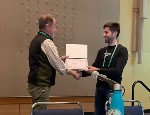 Dr Andrea Larosa receives the AGU Fred L. Scarf Award
Dr Andrea Larosa receives the AGU Fred L. Scarf Award20 December 2022
Queen Mary University of London’s Dr Andrea Larosa was celebrated as the recipient of the American Geophysical Union’s (AGU) 2022 Fred L. Scarf Award at a recent reception in Chicago.
 Queen Mary Researcher awarded funding to investigate integrating biodiversity and finance
Queen Mary Researcher awarded funding to investigate integrating biodiversity and finance 19 December 2022
A Queen Mary University of London researcher’s work is one of 12 projects awarded funding by the UK Research and Innovation to integrate biodiversity and finance.
 Shine Bright: NASA, Queen Mary and Edinburgh scientists use James Webb Space Telescope data to unveil young stars in early stages of formation
Shine Bright: NASA, Queen Mary and Edinburgh scientists use James Webb Space Telescope data to unveil young stars in early stages of formation15 December 2022
James Webb Space Telescope infrared capabilities pierce through dust clouds to make rare find.
 Queen Mary experts warn UK needs trade policy changes to tackle climate crisis
Queen Mary experts warn UK needs trade policy changes to tackle climate crisis15 December 2022
Government-led change is needed for trade policy to deliver COP27 promises, according to a new report from the UK Climate and Trade Commission, established by Queen Mary University of London in partnership with the Trade Justice Movement.
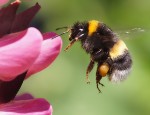
14 December 2022
Professor Lars Chittka and Matilda Gibbons have co-written for the Conversation on insects' ability to feel pain.
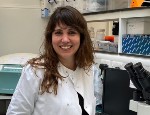 Queen Mary announces Strategic Collaboration Agreement with Envisagenics and Cancer Research Horizons
Queen Mary announces Strategic Collaboration Agreement with Envisagenics and Cancer Research Horizons13 December 2022
Collaboration will leverage Envisagenics' SpliceCore® AI platform for expanded discovery and research in hematopoietic cancers
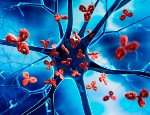
13 December 2022
Richard David Leslie, Professor of Diabetes and Autoimmunity at Queen Mary University of London, has written for the Conversation on stiff person syndrome.
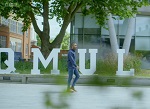 Queen Mary diversity experts feature in BBC social mobility film
Queen Mary diversity experts feature in BBC social mobility film 13 December 2022
The latest episode of BBC docuseries ‘How to Crack the Class Ceiling’ features Queen Mary experts on equality, diversity and inclusion sharing research insights to help young working-class people trying to secure prestigious jobs.
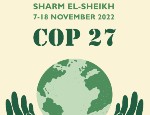
13 December 2022
Laleh Khalili, a Professor of International Politics at Queen Mary University of London, ethnographically observed the proceedings at COP27. She is currently researching a major project on the politics of hydrocarbons, after having won a British Academy/Leverhulme small grant to explore the subject. She is hoping to write a book about the everyday entanglements of hydrocarbons in all aspects of our lives.
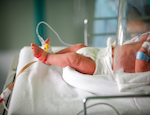 UK Government launches Newborn Genomes Programme
UK Government launches Newborn Genomes Programme13 December 2022
The UK Government has today (13 December) announced the launch of a Newborn Genomes Programme, a new research study that will explore the effectiveness of using whole genome sequencing to detect rare diseases in newborn babies.
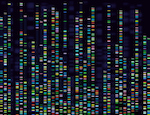 Queen Mary research recognised in top 10 advances in genomic medicine in 2022
Queen Mary research recognised in top 10 advances in genomic medicine in 2022 9 December 2022
Two papers from Queen Mary University of London have been selected by experts in genomic medicine in the ten most important advances in applying genomic medicine to clinical care in 2022.
 Research reveals the benefits of a classic chalk river plant, the water crowfoot (Ranunculus)
Research reveals the benefits of a classic chalk river plant, the water crowfoot (Ranunculus)7 December 2022
A PhD research project conducted by Queen Mary’s Dr Jessica Marsh in conjunction with the Game and Wildlife Conservation Trust (GWCT) has revealed the importance of water crowfoot – an aquatic plant found commonly in lowland rivers – in the conservation of young Atlantic salmon.
 Keeping faith: Research reveals pandemic lessons to help sustain and grow faith communities
Keeping faith: Research reveals pandemic lessons to help sustain and grow faith communities 7 December 2022
As the Office for National Statistics reports that Britain has become less religious, a new study from Queen Mary University of London details how faith groups can learn from Covid-19 to create new connections among different communities.
 Large international study uncovers genes involved in heart disease
Large international study uncovers genes involved in heart disease7 December 2022
Scientists link dozens of new genome sites to coronary artery disease risk and pioneer a powerful method for illuminating the biological roots of common disease.

7 December 2022
Salina Cuddy, lecturer in sociolinguistics at Queen Mary University of London, has written for the Conversation on the linguistic practice of 'code-switching'.
 BBC social mobility film explores Queen Mary accent bias research
BBC social mobility film explores Queen Mary accent bias research6 December 2022
Researchers from Queen Mary’s Department of Linguistics have shared their accent bias expertise and evidence-based advice in a new BBC docuseries on how social class can affect job prospects in the UK.
 COP27: Queen Mary experts leave their mark
COP27: Queen Mary experts leave their mark5 December 2022
Eight representatives from Queen Mary University of London attended the United Nations Climate Conference (COP27) in Egypt, helping to advance the implementation of effective climate change policies.
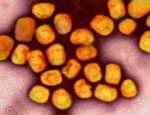 Queen Mary University of London academics share multidisciplinary research at Pandemic Research Symposium
Queen Mary University of London academics share multidisciplinary research at Pandemic Research Symposium 2 December 2022
Academics from across Queen Mary came together to share multidisciplinary knowledge about the Covid-19 and monkeypox pandemics to mitigate and prevent future global events.
 New research by Royal Botanic Gardens, Kew and Queen Mary researchers prompts urgent call from scientists to protect Madagascar’s unique biodiversity, before it’s too late
New research by Royal Botanic Gardens, Kew and Queen Mary researchers prompts urgent call from scientists to protect Madagascar’s unique biodiversity, before it’s too late 2 December 2022
In two new papers published in Science, researchers from the Royal Botanic Gardens, Kew, Queen Mary University of London, and partners from over 50 global organisations have undertaken a major review of Madagascar’s extraordinary biodiversity.
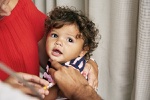 Action needed to tackle neighbourhood ‘hotspots’ where fewer than 60% of children receive first MMR vaccine on time
Action needed to tackle neighbourhood ‘hotspots’ where fewer than 60% of children receive first MMR vaccine on time2 December 2022
There has been an increase in neighbourhoods in north east London where fewer than 60% of children receive their first MMR vaccine on time following the pandemic, according to research from Queen Mary University of London.
 Queen Mary research exposes coastal landfill time bomb
Queen Mary research exposes coastal landfill time bomb30 November 2022
A new report published today by the Local Government Association (LGA) Coastal Special Interest Group (SIG) warns of “hidden silent ticking time bombs” presented by coastal landfill sites around England, supporting recent research from Professor Kate Spencer in Queen Mary’s School of Geography.
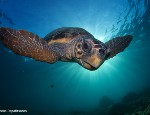 Instagram can support sea turtle conservation
Instagram can support sea turtle conservation 30 November 2022
Researchers have used Instagram to measure the pressures of tourism on loggerhead turtles in Zakynthos, Greece.
 Queen Mary academic secures University Research Fellowship from the Royal Society
Queen Mary academic secures University Research Fellowship from the Royal Society 30 November 2022
Dr Tom Macdonald, an 1851 Research Fellow in the School of Engineering and Materials Science at Queen Mary University of London, is one of 50 successful recipients of the Royal Society’s University Research Fellowship (URF) for 2022.
 Queen Mary Careers and The Bright Initiative by Bright Data collaborate on data skills workshop
Queen Mary Careers and The Bright Initiative by Bright Data collaborate on data skills workshop 29 November 2022
Understanding data and making it a positive force in society will be the focus of a virtual workshop for Queen Mary University of London students run by Bright Data, an industry-leading web data platform, as part of its Bright Initiative.
 Queen Mary University of London student named speedcuber Guinness World Record holder
Queen Mary University of London student named speedcuber Guinness World Record holder29 November 2022
Tower Hamlets 20-year-old George Edward Scholey, a third year English Literature student at Queen Mary, has a double life. By day, he dabbles in his love of James Joyce or ponders whether to re-read his favourite book, Oscar Wilde’s The Picture of Dorian Gray - but unlike Dorian he has no desire to sell his soul to ensure that a picture, rather than he, will age and fade.
 Experts urge employers and unions to tackle bullying and gender-based harassment in transport sector
Experts urge employers and unions to tackle bullying and gender-based harassment in transport sector28 November 2022
Research reveals that widespread bullying and gender-based harassment in the transport industry restricts female participation in a male-dominated workforce – with older and ethnic minority women facing a ‘triple threat’ risk of mistreatment

28 November 2022
Wolfson Institute of Population Health Professor of Primary Care Christopher Griffiths reflects on his experience at COP27.
 Queen Mary academic wins international political economy award
Queen Mary academic wins international political economy award28 November 2022
Liam Campling, Professor of International Business and Development, has been honoured with a prestigious accolade from the British International Studies Association (BISA).
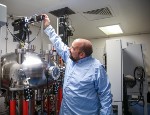 Professor Alan Drew appointed a Fellow of the Royal Society of Arts
Professor Alan Drew appointed a Fellow of the Royal Society of Arts25 November 2022
Professor Alan Drew has just been appointed to be a Fellow of the Royal Society for Arts (FRSA), for his charitable work in Indonesia.
 ‘Change, grow and give, so go live your moments’ Queen Mary Alumna Jaspreet Kaur performs her poem ‘The Moment’ at Festival of Remembrance at Albert Hall
‘Change, grow and give, so go live your moments’ Queen Mary Alumna Jaspreet Kaur performs her poem ‘The Moment’ at Festival of Remembrance at Albert Hall 24 November 2022
Accompanied by the String Ensemble of the Royal Marines Band Service, Queen Mary University of London Alumna Jaspreet Kaur (History BA, 2013) performed her poem ‘The Moment’ at the Festival of Remembrance at the Royal Albert Hall (November 12).
 Queen Mary University of London acquires first Cell DIVE multiplexed imager for a university outside of North America
Queen Mary University of London acquires first Cell DIVE multiplexed imager for a university outside of North America24 November 2022
Queen Mary University of London has become the first university outside of North America to acquire a Cell DIVE imager, providing access to the latest technology and ensuring that we remain world-leading in the fast-moving area of single-cell approaches.
 Hope for first blood test to detect deadly heart inflammation
Hope for first blood test to detect deadly heart inflammation24 November 2022
£50 blood test could improve diagnosis of myocarditis and help patients get lifesaving treatment earlier
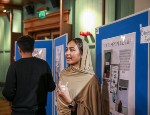 Queen Mary University of London and charity Social Action for Health hear from local young adults about their concerns about public health
Queen Mary University of London and charity Social Action for Health hear from local young adults about their concerns about public health 24 November 2022
Quoting the Bengali poet Rabindranath Tagore, Aiza Rahman, 17, of Beal High School, Ilford, proposed a question to the more than 85 people gathered at the Octagon on Queen Mary’s campus on Monday 14 November for an event about the future of community health.
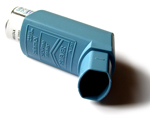 Risk of severe asthma attacks doubled after Covid-19 restrictions lifted
Risk of severe asthma attacks doubled after Covid-19 restrictions lifted24 November 2022
Adults with asthma had, at one point, an approximately doubled risk of a severe asthma attack after Covid-19 restrictions were relaxed in the UK, according to new research from Queen Mary University of London*, funded by Barts Charity.
 Queen Mary academics win prestigious European research funding
Queen Mary academics win prestigious European research funding 22 November 2022
Two academics in Queen Mary University of London’s School of Geography have been awarded highly competitive grants from the European Research Council (ERC) to support ground-breaking work.

21 November 2022
Dr Chloe Orkin, Professor of HIV Medicine at Queen Mary University of London and Director of the SHARE collaborative, has written for The Conversation after leading an international collaboration of clinicians to publish the first case study series of monkeypox infection during the 2022 outbreak in cisgender (cis) and transgender (trans) women and non-binary individuals assigned as female at birth.
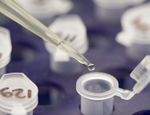 Boosted by $3 million in seed funding, Queen Mary spin-out heralds developments in cancer immunotherapies and a vision of immune system stimulation
Boosted by $3 million in seed funding, Queen Mary spin-out heralds developments in cancer immunotherapies and a vision of immune system stimulation21 November 2022
VacV Biotherapeutics (VacV), a cancer immunotherapy company and Queen Mary spin-out developing innovative viral-based therapies, has advanced its promising pipeline of pre-clinical treatments after strong testing results thus far.
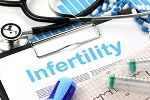 New research shows how IVF patients view medical evidence differently
New research shows how IVF patients view medical evidence differently 21 November 2022
People struggling with infertility take very different views on the medical evidence around treatment and need personally tailored support from doctors to make informed choices, according to a study by Queen Mary University of London published in the journal Sociology of Health and Illness this month.

18 November 2022
By Dr Fernando Barrio, School of Business and Management
The clock is ticking. The 27th United Nations Framework Convention on Climate Change (UNFCCC) Conference of the Parties (COP27) is nearly halfway through. Beyond the nice words, some announcements designed to make headlines and more explanations about how bad the climate crisis is, COP27’s outputs and results are far from what the world expects and what the planet needs.
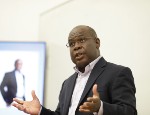 Homecoming: NASA engineer and alumnus Dr Ashitey Trebi-Ollennu explains how to drive a robot on Mars and shares insights into the famous Mars Rover launches
Homecoming: NASA engineer and alumnus Dr Ashitey Trebi-Ollennu explains how to drive a robot on Mars and shares insights into the famous Mars Rover launches18 November 2022
After graduating with a BEng in Avionics from Queen Mary University of London in 1991, Dr Ashitey Trebi-Ollennu returned to his alma mater on Wednesday (16 November) and was greeted like a rock star with more than 100 students, staff and alumni crammed into the People's Palace auditorium.
 Queen Mary University of London spin-off provides the blueprint for new game-changing AI applications
Queen Mary University of London spin-off provides the blueprint for new game-changing AI applications 18 November 2022
Veritone, Inc. has acquired the video recognition technology and related intellectual property developed by Vision Semantics Ltd (VSL), which was founded by Sean Gong, Professor of Visual Computation, as a spin-off from Queen Mary University of London.
 First study of monkeypox infection in women provides new insights to inform public health response to ongoing outbreak
First study of monkeypox infection in women provides new insights to inform public health response to ongoing outbreak17 November 2022
An international collaboration of clinicians, established and led by Professor Chloe Orkin at Queen Mary University of London, has published the first case study series of monkeypox infection during the 2022 outbreak in cisgender (cis) and transgender (trans) women and non-binary individuals assigned as female at birth.
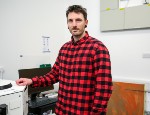 Atomically-thin ribbons can dramatically improve batteries needed for clean transport, as well as solar power
Atomically-thin ribbons can dramatically improve batteries needed for clean transport, as well as solar power17 November 2022
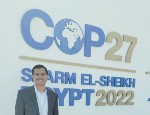
16 November 2022
By Dr Teidorlang Lyngdoh, SBM
During the 27th United Nations Conference of the Parties (COP27), I was privileged to be a week one delegate for Queen Mary University of London’s School of Business and Management.
 Centre of the Cell’s STEMPod to undergo state-of-the-art computer and film technology refurbishment
Centre of the Cell’s STEMPod to undergo state-of-the-art computer and film technology refurbishment16 November 2022
This new investment in our unique learning space will ensure that Centre of the Cell continues to inspire young people in East London and beyond.
 Not ‘one size fits all’: More research is needed into technology for elite women’s football to level the playing field
Not ‘one size fits all’: More research is needed into technology for elite women’s football to level the playing field16 November 2022
With the rapid rise in the growth and professionalism of women’s football in the UK, more research is needed into gender-specific technology to help elite female footballers perform at their best, according to research led by Queen Mary University of London and co-authored by England captain Leah Williamson.
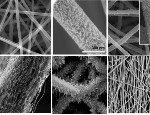
15 November 2022
Ana Jorge Sobrido explains why she works on Sustainable Electrodes for Redox Flow Batteries
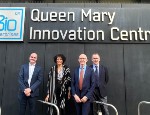 Queen Mary University of London welcomes Chi Onwurah MP, the Shadow Minister for Science, Research & Innovation
Queen Mary University of London welcomes Chi Onwurah MP, the Shadow Minister for Science, Research & Innovation14 November 2022
Chi Onwurah was briefed about the University’s plans for Research and Innovation on the new Life Sciences campus at Whitechapel, and its commitment to delivering projects that have local, national, and global benefit.
 Queen Mary’s Legal Advice Centre will hold a public event to celebrate the Fourth Global Annual Day of Action for Climate Justice
Queen Mary’s Legal Advice Centre will hold a public event to celebrate the Fourth Global Annual Day of Action for Climate Justice 11 November 2022
An event aimed at helping address fast fashion and its knock-on effects in the areas of labour law and environmental law will take place on Thursday 17 November between 10 am and 3pm. Organised by Queen Mary’s Legal Advice Centre, the event is open to all – members of the public as well as staff and students.
 Queen Mary researcher’s photo named as joint runner up in prestigious research image competition
Queen Mary researcher’s photo named as joint runner up in prestigious research image competition 11 November 2022
A photo by Queen Mary University of London postgraduate student Christina Gkantsinikoudi and lead researcher Dr Neil Dufton has been named as joint runner up in the British Heart Foundation’s Reflection of Research image competition.
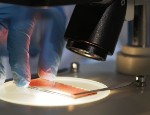 Detecting the undetected: measuring levels of three proteins in the blood can aid detection of undiagnosed prediabetes
Detecting the undetected: measuring levels of three proteins in the blood can aid detection of undiagnosed prediabetes10 November 2022
New research led by Queen Mary University of London’s Professor Claudia Langenberg, newly appointed Director of the Precision Healthcare University Research Institute, undertaken in her prior roles at the Berlin Institute of Health and University of Cambridge, has identified a three-protein signature in the blood that can improve detection of impaired glucose tolerance, a form of prediabetes.
 New study reveals genes that control our ‘metabolic individuality’ and disease risk
New study reveals genes that control our ‘metabolic individuality’ and disease risk10 November 2022
A new study co-led by Queen Mary University of London’s Professor Claudia Langenberg, newly appointed Director of the Precision Healthcare University Research Institute, undertaken in her prior roles at the Berlin Institute of Health at the Charité (BIH) and University of Cambridge, and Professor Adam Butterworth at the University of Cambridge, has discovered more than 300 regions in the genome that contribute to a person’s ‘chemical fingerprint`.
 Research identifies new way to halt pancreatic cancer invasion by targeting healthy cells
Research identifies new way to halt pancreatic cancer invasion by targeting healthy cells10 November 2022
Researchers from Barts Cancer Institute at Queen Mary University of London have identified a new channel of communication through which non-cancerous cells drive the invasion of cancer cells in pancreatic cancer.
 Queen Mary research behind art exhibition exploring politics of privacy and big tech
Queen Mary research behind art exhibition exploring politics of privacy and big tech8 November 2022
Research by Dr Philippa Williams and Dr Lipika Kamra looks at how ‘big tech’ like Meta-owned WhatsApp affects the ways that privacy is designed, regulated, discussed and experienced – by everyone from ordinary people to national governments.
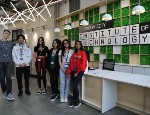 London City Institute of Technology welcomes first group of students studying higher-level technical courses to help close the skills gap in key STEM areas
London City Institute of Technology welcomes first group of students studying higher-level technical courses to help close the skills gap in key STEM areas8 November 2022
The London City Institute of Technology (LCIoT) has welcomed more than 200 students after opening its doors in late September.
 New drug can successfully treat patients typically resistant to high blood pressure treatment
New drug can successfully treat patients typically resistant to high blood pressure treatment7 November 2022
A new drug called Baxdrostat has been shown to significantly reduce high blood pressure (hypertension) in patients who may not respond to current treatments for the condition, according to results from a phase II trial led jointly by a Queen Mary University of London researcher and colleagues at CinCor Pharma, USA.
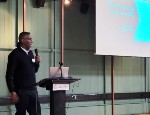 Queen Mary's new Centre for Academic Inclusion in Science and Engineering (CAISE) sets out to champion inclusive education
Queen Mary's new Centre for Academic Inclusion in Science and Engineering (CAISE) sets out to champion inclusive education 7 November 2022
CAISE aims to ensure all students have an equal opportunity to become scientists and engineers.
 Queen Mary tackles sustainability and environmental challenges
Queen Mary tackles sustainability and environmental challenges7 November 2022
Climate scientists and activists, Heads of State, minsters and CEOs have gathered at the 27th Conference of the Parties of the UNFCC (COP27) in Sharm-El-Sheikh, Egypt, as the window for climate change action narrows further.
 Queen Mary at the United Nations Climate Conference (COP27) in Egypt
Queen Mary at the United Nations Climate Conference (COP27) in Egypt7 November 2022
Queen Mary University of London’s engagement and expertise will be out in force at Sharm el-Sheik, Egypt, as world leaders, non-government organisations and activists gather for the UN Climate Conference known as COP27.
 Queen Mary experts warn Levelling Up agenda risks levelling down London arts and culture
Queen Mary experts warn Levelling Up agenda risks levelling down London arts and culture7 November 2022
Queen Mary University of London has appointed 12 Cultural Advocacy Fellows to help make the case for Government support of the arts and cultural heritage sectors, as new research highlights their importance to public life in the capital, following Friday's devastating funding cuts for some of the city's beloved institutions.
 Profiling the entire cancer genome identifies new subgroups of blood cancer that can be used to predict likely clinical outcomes
Profiling the entire cancer genome identifies new subgroups of blood cancer that can be used to predict likely clinical outcomes4 November 2022
A collaborative study in Nature Genetics has led to largest and most comprehensive analysis of the entire genomic landscape of the most common type of blood cancer called chronic lymphocytic leukaemia (CLL), as part of Queen Mary's 100,000 Genome Project.
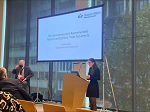 Queen Mary expert contributes to Report with draft legislation on paperless trade
Queen Mary expert contributes to Report with draft legislation on paperless trade4 November 2022
The report and draft legislation are the result of the Electronic Trade Documents project carried out by The Law Commission of England and Wales for the UK Government.
 New report calls for policy change to sustain and nurture artistic talent
New report calls for policy change to sustain and nurture artistic talent4 November 2022
Policymakers must help the creative sector to recover from the long-term impacts of Covid-19, according to newly published research on how the pandemic affected individual artists and the wider cultural economy.
 Queen Mary partners with Cornell as part of new ‘Global Hub’ initiative
Queen Mary partners with Cornell as part of new ‘Global Hub’ initiative4 November 2022
Queen Mary has signed a cooperation agreement with the leading Ivy League university in a collaboration focused on research and exchange opportunities.
 Queen Mary’s Centre for Public Engagement and charity Social Action for Health hold public event to hear from young people on the future of community health
Queen Mary’s Centre for Public Engagement and charity Social Action for Health hold public event to hear from young people on the future of community health4 November 2022
An event aimed at addressing the future of community health and spotlighting insights and priorities from local young adults will take place at the Octagon on Monday 14 November from 4 to 6 p.m.
 New Queen Mary research reveals impact of accent on social mobility
New Queen Mary research reveals impact of accent on social mobility3 November 2022
More than a quarter of senior professionals from working-class backgrounds have been singled out in the workplace for their accent, according to new research by Queen Mary’s professor of linguistics Devyani Sharma.
 Decarbonise the military: Researchers urge armed forces to report emissions
Decarbonise the military: Researchers urge armed forces to report emissions2 November 2022
Ahead of COP27, researchers are calling for the “massive” carbon footprint of the world’s armed forces to be measured and managed, in an article published today by prestigious journal Nature.
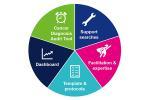 Cancer Toolkit will support GPs to reduce avoidable delays in cancer diagnosis and care
Cancer Toolkit will support GPs to reduce avoidable delays in cancer diagnosis and care1 November 2022
The Clinical Effectiveness Group (CEG) has launched a Cancer Toolkit to GP practices across North East London. It includes a clinical template, patient record searches, a data dashboard and a new Cancer Diagnosis Audit Tool. Together, the resources will support GP practice teams to address inequalities and deliver timely cancer diagnosis and care for everyone who needs it.
 Queen Mary appoints Bryony Butland as Director of Research and Innovation
Queen Mary appoints Bryony Butland as Director of Research and Innovation 31 October 2022
Dr Butland joins us from BEIS/UK Research & Innovation (UKRI) where she has previously led on work in BEIS to negotiate the UK research budget.
 First-ever study shows bumble bees ‘play’
First-ever study shows bumble bees ‘play’27 October 2022
Bumble bees play, according to new research led by Queen Mary University of London published in Animal Behaviour. It is the first time that object play behaviour has been shown in an insect, adding to mounting evidence that bees may experience positive ‘feelings’.
 New Global Health Research Centre will strengthen healthcare and build capacity in research for non-communicable diseases in Latin America
New Global Health Research Centre will strengthen healthcare and build capacity in research for non-communicable diseases in Latin America26 October 2022
Professor Victoria Bird, a researcher at Queen Mary University of London (Unit for Social and Community Psychiatry), has been awarded a £7m grant from the National Institute for Health and Care Research (NIHR) to develop a new Global Health Research Centre with partners across Latin America.
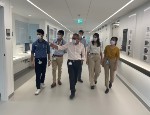 Cleveland Clinic London enters into medical education collaboration with Queen Mary University of London
Cleveland Clinic London enters into medical education collaboration with Queen Mary University of London25 October 2022
Cleveland Clinic London has begun training final year medical students from Queen Mary University of London’s Faculty of Medicine and Dentistry in an education collaboration that will help train the next generation of medical professionals.
 Award wins for Queen Mary human rights law expert
Award wins for Queen Mary human rights law expert24 October 2022
Associate professor in law Dr Hedi Viterbo has won prestigious international prizes for his latest book, which explores how the Israeli state and its critics shape and weaponise the categories of child versus adult.
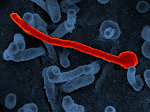
24 October 2022
Sophie Harman, Professor of International Politics, in the School of Politics and International Relations at Queen Mary University of London has written for The Conversation on why women need to be involved at every level of decision-making in the response to Ebola in Uganda.
 Queen Mary researchers named in top 100 female scientists in the UK
Queen Mary researchers named in top 100 female scientists in the UK21 October 2022
Frances Balkwill, Irene Leigh and Claudia Langenberg have been named in research.com’s top 100 female scientists in the UK.
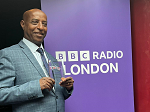 BBC praises graduate’s impact on East London community
BBC praises graduate’s impact on East London community 20 October 2022
Queen Mary alumnus Mentesnot Mengesha was honoured at BBC Radio London’s Make A Difference Awards for his efforts to help support low-income families in his local Newham.
 Archive of Queen Mary academic Peter Landin available at Bodleian Library at Oxford University
Archive of Queen Mary academic Peter Landin available at Bodleian Library at Oxford University20 October 2022
Located at 10 Godward Square, E1 4FZ, Queen Mary’s Peter Landin Building may seem like your average 1970s style building and home to computer science students, research labs and offices. But do you know the complex history of the person who the building is named after?
 New group to advance digital twins in healthcare
New group to advance digital twins in healthcare19 October 2022
Researchers from Queen Mary University of London are part of a consortium of nineteen partners that will aid personalised healthcare by using virtual copies of objects.
 Queen Mary University of London secures two prestigious sustainability credentials
Queen Mary University of London secures two prestigious sustainability credentials 18 October 2022
Certification from The British Standards Institute (BSI) and the Eco-Campus Platinum award confirm the University’s commitment to sustainability.

18 October 2022
Dr Felipe Antunes de Oliveira, Lecturer in Development and Global Governance in the School of Politics and International relations at Queen Mary University of London has written for 'E-International Relations' on the 2022 elections in Brazil.
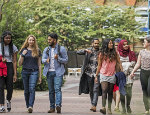
18 October 2022
Dr Jeffrey Kennedy, Lecturer in Criminal Law at Queen Mary University of London, has co-written for The Conversation on "mini-publics" and accessing meaningful, deliberative civic education.
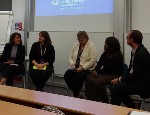 Queen Mary hosts tackling placed-based health inequalities panel with local council representatives
Queen Mary hosts tackling placed-based health inequalities panel with local council representatives17 October 2022
Queen Mary academics and representatives from two East London councils came together to discuss tackling place-based health inequalities in the local community.
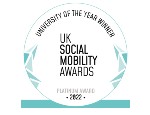 Queen Mary University of London wins the ‘University of the Year’ award at the sixth annual UK Social Mobility Awards
Queen Mary University of London wins the ‘University of the Year’ award at the sixth annual UK Social Mobility Awards14 October 2022
The UK Social Mobility Awards (SOMOs) 2022 has seen Queen Mary win the category of University of the Year.
 Queen Mary researchers ‘breaking through’ at Being Human Festival 2022
Queen Mary researchers ‘breaking through’ at Being Human Festival 202214 October 2022
Exploring the theme of ‘Breakthroughs’, this year's festival asks what we can imagine, rediscover, and celebrate through humanities research.
 Funding boost to help develop targeted healthcare for patients in east London
Funding boost to help develop targeted healthcare for patients in east London14 October 2022
Barts Health NHS Trust have received £20.9 million in funding from the National Institute for Health and Care Research (NIHR), providing a major boost to their plans to tackle health inequalities and deliver pioneering, innovative healthcare to the people of east London and beyond.
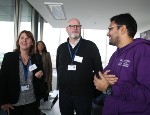 PwC and Queen Mary University of London celebrate the successes of the Flying Start programmes
PwC and Queen Mary University of London celebrate the successes of the Flying Start programmes13 October 2022
Senior partners from PricewaterhouseCoopers (PwC) visited Queen Mary University of London on Wednesday 12 October, meeting students enrolled on Queen Mary’s Flying Start programmes and senior leadership from the University, as well as touring the Mile End campus.
 Queen Mary expert demonstrates how art can be used to challenge and tackle injustice
Queen Mary expert demonstrates how art can be used to challenge and tackle injustice12 October 2022
A new book by creative and cultural industries lecturer Dr Paula Serafini examines the importance of art to the struggle for social, environmental and cultural justice in Latin America.
 Study of over 5 million people’s DNA reveals genetic links to height
Study of over 5 million people’s DNA reveals genetic links to height12 October 2022
An international team of researchers, including experts from Queen Mary University of London and the GIANT consortium, have identified over 12,000 genetic variants that influence a person’s height.
 New research outlines pandemic policy lessons for London’s leaders
New research outlines pandemic policy lessons for London’s leaders12 October 2022
Major policy changes are needed for London to recover from the long-term impacts of Covid-19, according to the latest Queen Mary research on how the pandemic affected communities across the capital.
 The REMODEL project: Remodelling tumour microenvironments to improve immunotherapy
The REMODEL project: Remodelling tumour microenvironments to improve immunotherapy12 October 2022
Professor Fran Balkwill from Barts Cancer Institute at Queen Mary University of London has received a UK Research and Innovation (UKRI) Frontier Research grant of over £2 million to investigate the most effective ways to remodel cancers to enhance the effects of immunotherapy.
 Queen Mary marks Black History Month
Queen Mary marks Black History Month 10 October 2022
October 2022 sees Queen Mary University of London marking Black History Month with its biggest celebration yet, including many collaborative activities to engage, inspire and educate its students, staff and wider community about this important annual event.
 IP is the name of the game: First global study into copyright infringement and enforcement strategies in the video game industry reveals key threats and recommendations
IP is the name of the game: First global study into copyright infringement and enforcement strategies in the video game industry reveals key threats and recommendations10 October 2022
The study, involving researchers from Queen Mary University of London and the University of Bristol, is critical in the face of an industry that is growing and evolving at a rapid pace.
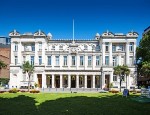
6 October 2022
Professor Alison Blunt, Deputy Vice-Principal for Impact (Culture, Civic & Community), shares recent news about KEF2 and the National Civic Impact Accelerator (NCIA)
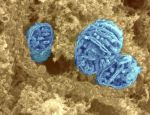 A new route to evolution: how DNA from our mitochondria works its way into our genomes
A new route to evolution: how DNA from our mitochondria works its way into our genomes5 October 2022
Scientists have shown that in one in every 4,000 births, some of the genetic code from our mitochondria – the ‘batteries’ that power our cells – inserts itself into our DNA, revealing a surprising new insight into how humans evolve.
 Queen Mary academic’s new book explores the entanglement of technology and trauma
Queen Mary academic’s new book explores the entanglement of technology and trauma 4 October 2022
Humanity’s reliance on technologies that narrate and circulate trauma as a cultural form is the focus of the latest work from Dr Yasmin Ibrahim, Professor of Digital Economy and Culture at Queen Mary University of London.
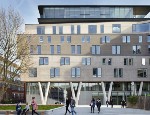 Queen Mary University of London's Faculty of Science and Engineering to invest in 30 new research-focused permanent academic posts
Queen Mary University of London's Faculty of Science and Engineering to invest in 30 new research-focused permanent academic posts 4 October 2022
The new posts are part of an ambitious growth plan, further strengthening the Faculty's outstanding world-leading research.
 Children and young adults with Down Syndrome four times more likely to have diabetes
Children and young adults with Down Syndrome four times more likely to have diabetes4 October 2022
Children and young adults* with Down Syndrome are four times more likely to be diagnosed with diabetes, according to new research led by Queen Mary University of London and King’s College London.
 Suicide risk almost seven times higher after diagnosis of young onset dementia
Suicide risk almost seven times higher after diagnosis of young onset dementia3 October 2022
A study of nearly 600,000 people in England shows that suicide risk in the first three months following a dementia diagnosis for patients aged under 65 is nearly 7 times higher than in patients without dementia.
 Queen Mary chemical engineers have developed technologies to slash energy consumption in industry
Queen Mary chemical engineers have developed technologies to slash energy consumption in industry30 September 2022
In two papers published in the journals Nature and Science, Queen Mary's Professor Livingston and Dr Zhiwei Jiang present their work on nanomembranes – exquisitely thin membranes that can provide an energy efficient alternative to current industry practices.
 Queen Mary academic wins feminist political research award
Queen Mary academic wins feminist political research award29 September 2022
Kimberly Hutchings, Professor of Politics and International Relations, has been honoured with a prestigious accolade from the American Political Science Association (APSA).

29 September 2022
Karl Pike, Lecturer in British Politics/Public Policy in the School of Politics and International Relations at Queen Mary University of London has written for The Conversation on the speech that Kier Starmer gave at the Labour Conference 2022.
-150.jpg) Queen Mary appoints Phil Clare as CEO of Queen Mary Innovation
Queen Mary appoints Phil Clare as CEO of Queen Mary Innovation 27 September 2022
Dr Clare will drive knowledge exchange and commercialisation of Queen Mary’s innovations in science, technology and the life sciences.
 Healthcare workers more than three times more likely to have experienced burnout during the COVID-19 pandemic
Healthcare workers more than three times more likely to have experienced burnout during the COVID-19 pandemic27 September 2022
Healthcare professionals working during the coronavirus (COVID-19) pandemic are up to 3.3-times more likely to be burned out compared to non-healthcare professionals, despite the rates of mental health issues being similar, according to new research led by Queen Mary University of London.
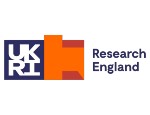 Queen Mary University of London confirmed as a leader in Research England’s second Knowledge Exchange Framework
Queen Mary University of London confirmed as a leader in Research England’s second Knowledge Exchange Framework27 September 2022
Strong results show Queen Mary’s commitment to collaboration between researchers and external partners for the benefit of the economy and society.
 Queen Mary and Barts Health announce the appointment of new Clinical Team
Queen Mary and Barts Health announce the appointment of new Clinical Team 23 September 2022
A new team of Deputy Directors of Clinical Research has been appointed jointly by Queen Mary University of London and Barts Health NHS Trust to support the work of recently appointed Director of Clinical Research, Professor Rupert Pearse.
 Queen Mary research behind new exhibition to help find lost children of Jewish families in Israel
Queen Mary research behind new exhibition to help find lost children of Jewish families in Israel23 September 2022
A major new exhibition of research by Dr James Eastwood, Senior Lecturer in Politics and International Relations at Queen Mary, aims to help Jewish migrant families uncover the fates of hundreds of children who disappeared in the early years of the State of Israel.
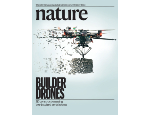 Teams of bee-like drones are ready to 3D-print buildings
Teams of bee-like drones are ready to 3D-print buildings 22 September 2022
‘The homes and cities of the future could be built with the help of autonomous robots,’ says Queen Mary’s Dr Ketao Zhang.
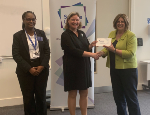 Queen Mary becomes Science Council Employer Champion
Queen Mary becomes Science Council Employer Champion20 September 2022
Queen Mary has joined the Science Council’s Employer Champion Programme.
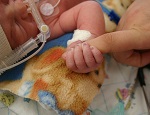
20 September 2022
Dr Heather McMullen, Lecturer at Queen Mary's Centre for Public Health & Policy, has co-written for The Conversation on her research into Birthstrike and its flaws before the campaign disbanded in 2021.
 Matter at extreme conditions of very high temperature and pressure turns out to be remarkably simple and universal
Matter at extreme conditions of very high temperature and pressure turns out to be remarkably simple and universal20 September 2022
New discoveries open the way to a new understanding of supercritical matter
 Queen Mary students to gain valuable research experience through placements at the Alan Turing Institute
Queen Mary students to gain valuable research experience through placements at the Alan Turing Institute 20 September 2022
Seven postgraduate research students from Queen Mary University of London have successfully been awarded an Enrichment placement at The Alan Turing Institute, starting in October.
 Queen Mary students launch public health campaign after nitrous oxide causes rise in spinal complications among young people
Queen Mary students launch public health campaign after nitrous oxide causes rise in spinal complications among young people20 September 2022
Medical students at Queen Mary University of London have launched a public health campaign to educate teenagers on the neurological risks of using nitrous oxide.
 Understanding the role of cancer’s circular genome in tumour evolution
Understanding the role of cancer’s circular genome in tumour evolution19 September 2022
New research, co-led by Dr Benjamin Werner from Barts Cancer Institute and Dr Weini Huang from the School of Mathematical Sciences at Queen Mary University of London, indicates that the circular DNA structures present in around a third of cancers lead to extensive genetic diversity within tumours, giving them the ability to adapt rapidly to environmental stress and resist targeted cancer treatment.
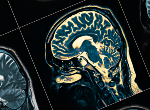
12 September 2022
James Brunton Badenoch from Queen Mary University of London has written for The Conversation on a new study on the effects of monkeypox.
 Her Majesty The Queen, Elizabeth II: 1926-2022
Her Majesty The Queen, Elizabeth II: 1926-20229 September 2022
It is with great sadness that we learn of the death of Her Majesty The Queen. We extend our deepest sympathies to The Royal Family at this very difficult time.
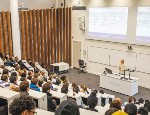
8 September 2022
Professor Stephanie Marshall, Vice-Principal (Education) at Queen Mary University of London has written for Times Higher Education on how undergraduates can benefit and contribute to the pipeline of interdisciplinary research.
 CEG provides swift response to data needs for the Polio Booster Campaign
CEG provides swift response to data needs for the Polio Booster Campaign
6 September 2022
Queen Mary’s Clinical Effectiveness Group (CEG) is collaborating with the NHS in North East London, providing intelligence to inform the logistics of the immunisation campaign and software tools to ease the burden for GPs.
 Queen Mary appoints Claudia Langenberg as Director of new Precision Healthcare University Research Institute
Queen Mary appoints Claudia Langenberg as Director of new Precision Healthcare University Research Institute5 September 2022
We are delighted to announce the appointment of Professor Claudia Langenberg as the Director of Queen Mary’s new Precision Healthcare University Research Institute (PHURI).
 Queen Mary appoints key role for its Digital Environment Research Institute
Queen Mary appoints key role for its Digital Environment Research Institute26 August 2022
Queen Mary University of London has announced the appointment of Professor David Leslie as Professor of Ethics, Technology and Society at the University’s Digital Environment Research Institute (DERI).

25 August 2022
Dr Rachel Bryant Davies, Lecturer in Comparative Literature at Queen Mary University of London, has written for the Conversation on suggested reads inspired by Homer’s Odyssey.
 Leading scholars join Queen Mary’s Institute for Humanities and Social Sciences
Leading scholars join Queen Mary’s Institute for Humanities and Social Sciences23 August 2022
21 new Fellows will join the Institute for the Humanities and Social Sciences (IHSS) at Queen Mary University of London in the new academic year (2022/23).
 Large-scale study of Brazilian wetlands ramps up evidence that biodiversity loss undermines ecosystem functioning
Large-scale study of Brazilian wetlands ramps up evidence that biodiversity loss undermines ecosystem functioning23 August 2022
A new study analyses human impacts on biodiversity and ecosystem functioning in 72 lakes distributed across four large neotropical wetlands of Brazil – Amazon, Araguaia, Pantanal and Paraná. The research spans a 3.7million km gradient of human activities in Brazil.
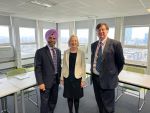 Queen Mary opens new medical campus in Ilford
Queen Mary opens new medical campus in Ilford22 August 2022
Redbridge Council has this week announced that Queen Mary University of London will be opening a satellite campus for the teaching of medicine in the heart of Ilford.
 Queen Mary academic’s new book explores how to harness the power of creativity and innovation
Queen Mary academic’s new book explores how to harness the power of creativity and innovation 18 August 2022
A newly published book by Dr SMA Moin, Associate Professor in Marketing at Queen Mary University of London, offers an insightful interdisciplinary perspective on the concepts of creativity and innovation.
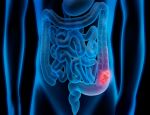 Researchers offer solution to help tackle patient backlog in the NHS bowel cancer screening programme
Researchers offer solution to help tackle patient backlog in the NHS bowel cancer screening programme 17 August 2022
Research suggests that a solution for clearing the backlog of patients in the bowel cancer screening programme awaiting colonoscopy appointments is to raise the blood level on the test that triggers a colonoscopy invitation.
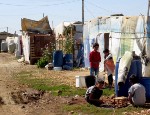 Only 1 in 5 Syrian children in refugee camps show resilience to mental health problems
Only 1 in 5 Syrian children in refugee camps show resilience to mental health problems12 August 2022
Many more Syrian children living in refugee camps appear to be living with mental health problems than previously thought, according to new in-the-field research led by Queen Mary.
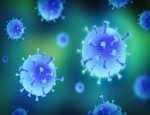 Researchers identify new genomic regions that influence the severity of COVID-19 disease
Researchers identify new genomic regions that influence the severity of COVID-19 disease9 August 2022
An international collaboration of human geneticists involving researchers at Queen Mary University of London and the Genes & Health study has identified 11 new genomic regions that influence the severity of COVID-19 disease.
 Prestigious theatre award for Queen Mary arts experts
Prestigious theatre award for Queen Mary arts experts8 August 2022
Queen Mary's Professor Lois Weaver and honorary Doctor of Letters Peggy Shaw have won a prestigious award from the Association for Theatre in Higher Education (ATHE).
 Queen Mary research is changing the way we think about bees
Queen Mary research is changing the way we think about bees5 August 2022
Hot on the heels of his new book ‘The Mind of a Bee’, Professor Lars Chittka’s lab shows that bumblebees appear to feel pain
 Queen Mary students win scholarship boosting social mobility in the City
Queen Mary students win scholarship boosting social mobility in the City4 August 2022
Queen Mary law undergraduate student Tyron Denton and politics undergraduate student Idris Noor have won the prestigious Freshfields Stephen Lawrence scholarship, which aims to boost social mobility in large commercial firms where black men are under-represented.
 Two Queen Mary academics awarded National Teaching Fellowships
Two Queen Mary academics awarded National Teaching Fellowships4 August 2022
Dr Jennifer Randall and Dr Louise Younie, both from Queen Mary University of London’s Faculty of Medicine and Dentistry, have today been awarded a National Teaching Fellowship (NTF) by Advance HE.
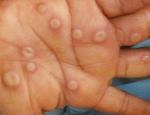
3 August 2022
Professor Chloe Orkin has written for The Conversation on monkeypox, discussing how it spreads, public health messaging, and the importance of vaccinations.
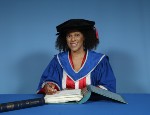 Bernardine Evaristo receives honorary Queen Mary degree
Bernardine Evaristo receives honorary Queen Mary degree29 July 2022
Celebrated author Bernardine Evaristo collected an honorary doctorate from Queen Mary University of London today (Friday 29 July 2022) as part of summer graduation ceremonies at the historic People’s Palace in Mile End.
 New clinical symptoms identified in largest international case study series of confirmed monkeypox cases
New clinical symptoms identified in largest international case study series of confirmed monkeypox cases 21 July 2022
An international collaboration of clinicians led by Queen Mary University of London has identified new clinical symptoms in people infected with monkeypox in the largest case study series to date.
 Queen Mary launches new Commission with Trade Justice Movement to help solve climate crisis
Queen Mary launches new Commission with Trade Justice Movement to help solve climate crisis21 July 2022
A new UK Climate and Trade Commission, set up by Queen Mary University of London and the Trade Justice Movement, aims to help find policy solutions to the climate challenge.
-Breast-screening-150.jpg) Benefits of NHS Breast Screening Programme outweigh the small risk of overdiagnosis
Benefits of NHS Breast Screening Programme outweigh the small risk of overdiagnosis 19 July 2022
The NHS Breast Screening Programme in England has shown little, if any, evidence of overdiagnosis according to a new study from Queen Mary University of London and King’s College London researchers, funded by the National Institute for Health and Care Research.
 Pioneering climate change research reveals long-term global carbon cycle impacts
Pioneering climate change research reveals long-term global carbon cycle impacts14 July 2022
A new study in the prestigious journal Nature Geoscience, co-authored by Dr Heather Ford from Queen Mary’s School of Geography, uses a unique research model to illustrate how past geologic periods can help us understand future climate changes.

8 July 2022
Dr Richard Johnson, Lecturer in US Politics & Policy at Queen Mary University of London has written for The Conversation on the US Supreme Court overturning Roe v Wade.
 UK community survey demonstrates overwhelming demand for monkeypox vaccine information and vaccine roll-out
UK community survey demonstrates overwhelming demand for monkeypox vaccine information and vaccine roll-out7 July 2022
Interim data from a community-based monkeypox (MPXV) survey demonstrates an overwhelming demand for monkeypox vaccine and vaccine-roll-out, especially amongst those who consider themselves to be at risk-of MPXV.
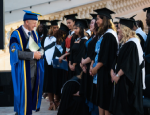 Queen Mary’s Malta Campus holds its first graduation ceremony
Queen Mary’s Malta Campus holds its first graduation ceremony7 July 2022
On Tuesday 5 July, Queen Mary University of London’s Malta Campus held its first ever Graduation Ceremony for the Bachelor of Medicine, Bachelor of Surgery (MBBS) class of 2022 at the historic Cittadella on the island of Gozo.
 Queen Mary student Maria: “It was important to me to go to a university where I would feel at home.”
Queen Mary student Maria: “It was important to me to go to a university where I would feel at home.” 6 July 2022
Maria accepted a place studying Neuroscience at Queen Mary through Clearing in 2020, after her gap year volunteering was disrupted by the Covid-19 pandemic.
Here, Maria opens up on the change of circumstances, studying at Queen Mary, and her advice for students entering Clearing this year.
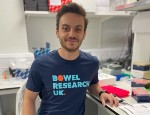 Meet Kane, the Queen Mary student behind a new STEM internships scheme for Black and Minority Ethnic care-leavers
Meet Kane, the Queen Mary student behind a new STEM internships scheme for Black and Minority Ethnic care-leavers5 July 2022
Kane Smith, a first-year PhD student who grew up in the care system, has created and is leading a new internship initiative at Queen Mary University of London for BAME care-leavers in Tower Hamlets, providing vital research skills and fuelling their passion for science and health.
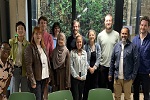 Queen Mary experts pioneer evaluation training for arts and cultural heritage sector
Queen Mary experts pioneer evaluation training for arts and cultural heritage sector4 July 2022
Local and national arts and cultural heritage organisations are taking part in a new pilot programme, led by People’s Palace Projects as part of Queen Mary’s ongoing Arts and Culture strategy, to help the sector demonstrate its value to funders and other key stakeholders.
 Sustainability, curriculum transformation and student success – recapping the 2022 Drapers’ Lecture
Sustainability, curriculum transformation and student success – recapping the 2022 Drapers’ Lecture4 July 2022
Each year, the Drapers' Company supports a lecture on learning and teaching, hosted by Queen Mary University of London.
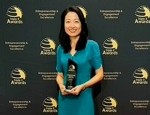 Dr Joanne Zhang wins Entrepreneurship Educator of the Year Award for Queen Mary Social Venture Fund
Dr Joanne Zhang wins Entrepreneurship Educator of the Year Award for Queen Mary Social Venture Fund4 July 2022
Dr Joanne Zhang from Queen Mary’s School of Business and Management has won the Entrepreneurship Educator of the Year Award at the 2022 European Triple E Awards.

1 July 2022
Rodrigo Olivares-Caminal, Professor of Banking and Finance Law at Queen Mary University of London, has written for the Conversation on the Russian debt default.
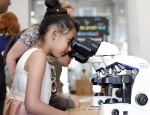 2022 Festival of Communities Sets New Attendance Record
2022 Festival of Communities Sets New Attendance Record1 July 2022
After a two-year hiatus, the Festival of Communities returned with an all-time high of 8,000 people attending for an action-packed two days of activities, workshops, performances and games.
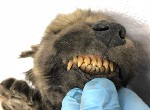 Genomic analysis shows 18,000-year-old-puppy Dogor is a wolf
Genomic analysis shows 18,000-year-old-puppy Dogor is a wolf1 July 2022
When Dogor was found in frozen mud in Siberia, scientists couldn't tell if he was a wolf or an early dog.
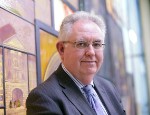 Professor Sir Mark Caulfield recognised for services to medicine
Professor Sir Mark Caulfield recognised for services to medicine 1 July 2022
Professor Sir Mark Caulfield, Vice Principal for Health at Queen Mary University of London has received an honorary degree from Queen’s University Belfast.
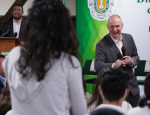 President and Principal of Queen Mary University of London visits Mexico to expand and strengthen partnerships with Mexican Institutions
President and Principal of Queen Mary University of London visits Mexico to expand and strengthen partnerships with Mexican Institutions30 June 2022
Professor Colin Bailey, President and Principal of Queen Mary University of London, visited Mexico in early June. He started his busy schedule with a visit to the Autonomous University of Baja California (UABC) where he was greeted by the Rector, Professor Daniel Octavio Valdez-Delgadillo, and his senior leadership team before attending a ceremony to sign an agreement between Queen Mary and UABC.
 Queen Mary academic to lead interdisciplinary social science partnership
Queen Mary academic to lead interdisciplinary social science partnership29 June 2022
Pietro Panzarasa, Professor of Networks and Innovation at Queen Mary University of London, has been appointed the Director of the London Interdisciplinary Social Science Doctoral Training Partnership (LISS DTP).
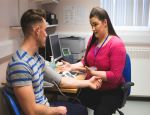 Seeing the same GP is good for your health, but only half of patients are able to do so
Seeing the same GP is good for your health, but only half of patients are able to do so29 June 2022
Researchers at Queen Mary University of London found that only half of patients regularly see the same GP, despite increasing evidence that continuity of care between GPs and patients leads to better outcomes.
 Celebrated classical singer to perform in FRIDA by Queen Mary’s Paul Edlin
Celebrated classical singer to perform in FRIDA by Queen Mary’s Paul Edlin28 June 2022
Celebrated classical singer Katie Bray will sing the role of Frida Kahlo in FRIDA by Paul Edlin, Queen Mary’s Director of Music. Katie will perform alongside the East London Music Group on Sunday 10 July 2022 in Queen Mary University of London’s Octagon.
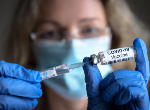 Interrupting the treatment of vulnerable people on immune-suppressing medicines doubles their antibody response to COVID-19 booster vaccination
Interrupting the treatment of vulnerable people on immune-suppressing medicines doubles their antibody response to COVID-19 booster vaccination28 June 2022
A major clinical trial, involving researchers from Queen Mary University of London and led by the University of Nottingham, has found that by interrupting the treatment of vulnerable people on long-term immune suppressing medicines for two weeks after a COVID-19 booster vaccination, their antibody response to the jab is doubled.
 “It’s never too late to change your mind” says Queen Mary student Harriet
“It’s never too late to change your mind” says Queen Mary student Harriet27 June 2022
Harriet Spoor, a Politics student, has just completed her first year at Queen Mary University of London. After a late change of direction, Harriet arrived from the Sydney Russell School in Dagenham through Clearing and she is keen to share her experience with students ahead of this year’s Results Day.
 Queen Mary business and economics alumni create multi-million company
Queen Mary business and economics alumni create multi-million company 24 June 2022
Queen Mary alumni who built a multi-million pound business have said the university was key in supporting their entrepreneurial ventures.
 Queen Mary scientist wins UKRI fellowship to develop membranes that will advance medicines and vaccines
Queen Mary scientist wins UKRI fellowship to develop membranes that will advance medicines and vaccines 24 June 2022
Membrane scientist Dr. Zhiwei Jiang has been selected as one of eighty-four of the most promising science and research leaders to win a UKRI Future Leaders Fellowships scheme.

23 June 2022
Queen Mary's Professor of Human Rights Law, Merris Amos, has written for the Conversation about plans to replace the 1998 Act with a new UK Bill.
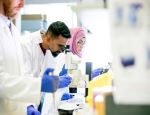 Boosting the development and capacity of clinical trials in East London
Boosting the development and capacity of clinical trials in East London22 June 2022
 Research highlights UK pay gap for Caribbean workers on Windrush Day
Research highlights UK pay gap for Caribbean workers on Windrush Day22 June 2022
As the UK marks Windrush Day (22 June), research from Queen Mary University of London and the University of Birmingham for Business In The Community (BITC) reveals troubling trends around race in the workplace, including a persistent pay gap for people from a Caribbean background.
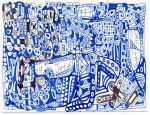 Science and art collide at this year’s Royal Academy’s Summer Exhibition
Science and art collide at this year’s Royal Academy’s Summer Exhibition21 June 2022
An artwork by Queen Mary University of London cancer researcher, Professor Tyson Valentine Sharp, has been selected for display in Room VIII at the Royal Academy of Art’s prestigious Summer Exhibition.

17 June 2022
Professor Brigitte Granville from Queen Mary's School of Business and Management is one of three economists writing for the Conversation on stagflation and the possibility of a recession.
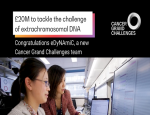 Queen Mary University of London researchers join global Cancer Grand Challenges team taking on some of the most challenging forms of cancer
Queen Mary University of London researchers join global Cancer Grand Challenges team taking on some of the most challenging forms of cancer16 June 2022
Two researchers from Queen Mary University of London are part of a new world-class team of researchers that has been selected to receive a £20m Cancer Grand Challenges award.
 Total methane and CO2 emissions from liquefied natural gas carriers (LNGs) measured for the first time
Total methane and CO2 emissions from liquefied natural gas carriers (LNGs) measured for the first time16 June 2022
The study, led by Queen Mary’s Dr Paul Balcombe, provides important data as LNG imports are likely to grow substantially to reduce Europe’s reliance on Russian gas.
 Queen Mary receives funding to accelerate bright ideas into global opportunities
Queen Mary receives funding to accelerate bright ideas into global opportunities15 June 2022
Queen Mary University of London has received more than £1 million as part of this year’s Impact Acceleration Account (IAA). UK Research and Innovation (UKRI), a government body responsible for delivering £8 billion research and innovation funding each year, is investing £118 million in the latest round of IAAs to translate research across 64 universities and research organisations.
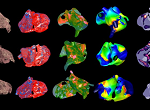 Queen Mary Science and Engineering researchers awarded UKRI Future Leaders Fellowships to tackle heart irregular heart rhythms and explore turbulence in space plasma
Queen Mary Science and Engineering researchers awarded UKRI Future Leaders Fellowships to tackle heart irregular heart rhythms and explore turbulence in space plasma15 June 2022
Dr Caroline Roney and Dr Christopher Chen are among 84 promising leaders awarded fellowships totalling £98 million.
 Queen Mary’s Legal Advice Centre wins civic engagement award
Queen Mary’s Legal Advice Centre wins civic engagement award15 June 2022
A free community legal clinic at Queen Mary University of London has won the hotly contested MacJannet Prize for Global Citizenship, which recognises exemplary university student civic engagement programmes around the world.
 More than a quarter of people with asthma are still over-using rescue inhalers – putting them at increased risk of severe attacks and hospitalisation
More than a quarter of people with asthma are still over-using rescue inhalers – putting them at increased risk of severe attacks and hospitalisation15 June 2022
Researchers at Queen Mary University of London have found that more than a quarter of asthma patients are still over-using inhalers intended for rapid relief of symptoms.
 Omicron infection is a poor booster of COVID-19 immunity
Omicron infection is a poor booster of COVID-19 immunity 14 June 2022
People infected with the Omicron variant show poor immune boosting against future SARS-CoV-2 infection, according to the findings of a study published in the journal Science. The research team, which included researchers from Queen Mary University of London, looked at how the complex patchwork of immunity in the population following vaccination and previous infection influences our future protection against SARS-CoV-2.
 Tackling the obesity epidemic with new research on metabolism
Tackling the obesity epidemic with new research on metabolism13 June 2022
Researchers from Queen Mary have been awarded £2.67 million in funding to conduct innovative research in the field of metabolism.
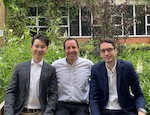 IOM3 awards: Queen Mary scoops up four prizes for engineering and materials science
IOM3 awards: Queen Mary scoops up four prizes for engineering and materials science9 June 2022
The School of Engineering and Materials Science goes from strength to strength as researchers pick up four awards and medals from the Institute of Materials, Minerals and Mining (IOM3)
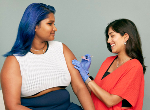 Funding success for project to improve sex and gender inclusivity in medical research
Funding success for project to improve sex and gender inclusivity in medical research8 June 2022
Professor Chloe Orkin, Clinical Professor of HIV Medicine at the Blizard Institute, is named as a collaborator on a new project that aims to develop policy on how sex and gender are considered in medical research in the UK.
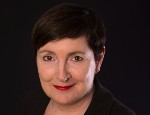 Queen Mary’s Deputy Vice Principal (Health) recognised in the Queen’s Birthday Honours
Queen Mary’s Deputy Vice Principal (Health) recognised in the Queen’s Birthday Honours2 June 2022
Professor Joanne Martin, also Director of the Blizard Institute and Professor of Pathology at Queen Mary University of London, has received a CBE for services to the NHS and Medical Education in the Queen’s Birthday Honours.
 Levelling up agenda risks levelling down London, warns new research
Levelling up agenda risks levelling down London, warns new research
1 June 2022
The Government’s ‘levelling up’ agenda risks levelling down London and deepening inequalities in the capital, according to research published from Queen Mary University of London and the Centre for London thinktank.
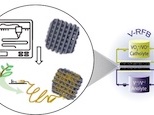 Queen Mary partners with the Faraday Institution to power up redox flow batteries
Queen Mary partners with the Faraday Institution to power up redox flow batteries 1 June 2022
Queen Mary’s Dr Ana Jorge Sobrido will lead a project to overcome engineering issues that are currently preventing the wide-spread adoption of redox flow batteries (RFBs).
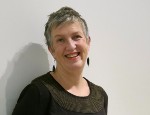 Mary Collins appointed as Director of Queen Mary’s Blizard Institute
Mary Collins appointed as Director of Queen Mary’s Blizard Institute1 June 2022
Professor Mary Collins, the new Director of Queen Mary University of London’s Blizard Institute, has ambitious plans for expanding our world-leading multidisciplinary research.
 Office politics can be a force for good, new research shows
Office politics can be a force for good, new research shows31 May 2022
Office politics is often associated with toxic cultures and marginalised groups, but a new study in the Harvard Business Review has identified five strategies for organisations to promote ‘healthy office politics’ that foster inclusive and supportive working environments.
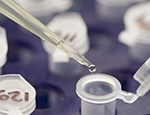 Queen Mary researchers receive prestigious MRC grant for collaborative research project to better understand human disease
Queen Mary researchers receive prestigious MRC grant for collaborative research project to better understand human disease30 May 2022
Dr Sarah McClelland of Queen Mary University of London is part of a collaborative project that has been awarded £1.2 million in funding from the Medical Research Council (MRC) to investigate the mechanisms leading to cancer development in cells infected with human papillomavirus (HPV).

30 May 2022
Professor Devyani Sharma and Zoe Adams from Queen Mary's School of Languages, Linguistics and Film have co-written for The Conversation on new research into interacting in social dilemmas.
 Physics and machine-learning join hands as molecular modelling doctoral network is awarded €2.6m EU Horizon funding
Physics and machine-learning join hands as molecular modelling doctoral network is awarded €2.6m EU Horizon funding25 May 2022
The EU Horizon Europe Marie Skłodowska–Curie Actions Doctoral Network ‘PHYMOL’ has been awarded nearly €2.6m following an application coordinated by Queen Mary’s Dr Alston J. Misquitta.
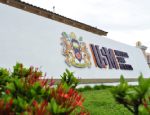 Queen Mary forms strategic partnership with Universiti Sains Malaysia
Queen Mary forms strategic partnership with Universiti Sains Malaysia24 May 2022
Queen Mary University of London has entered into a Strategic Partnership with public research university, Universiti Sains Malaysia to further drive transnational education, research and impact opportunities.
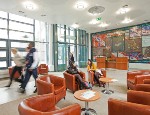 Queen Mary retains the HR Excellence in Research award after a 10-year review
Queen Mary retains the HR Excellence in Research award after a 10-year review23 May 2022
Queen Mary University of London has retained the HR Excellence in Research award following a 10-year review by Vitae, a non-profit global leader in supporting researchers’ professional development.

20 May 2022
Dr Dipesh Gopal from Queen Mary's Wolfson Institute of Population Health has written for The Conversation giving advice for young people with long Covid.
 Queen Mary's Faculty of Science and Engineering celebrates its REF success
Queen Mary's Faculty of Science and Engineering celebrates its REF success20 May 2022
Queen Mary University of London has excelled in the latest Research Excellence Framework (REF) 2021, being ranked joint 7th in the UK for the quality of its research. This confirms once again the University’s status as one of the best research-intensive universities in the UK.
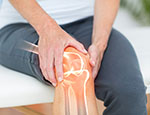 New study shows genes can predict response to arthritis treatment and paves the way for future drug development
New study shows genes can predict response to arthritis treatment and paves the way for future drug development19 May 2022
New research from Queen Mary University of London, published in Nature Medicine, has shown that molecular profiling of the diseased joint tissue can significantly impact whether specific drug treatments will work to treat rheumatoid arthritis (RA) patients.

18 May 2022
Professor Parvati Nair from Queen Mary's School of Languages, Linguistics and Film has written for The Conversation on the rights of refugees and the obligations of states.
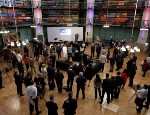 Queen Mary marks winning first-ever Platinum award for Public Engagement and launches Civic University Agreement
Queen Mary marks winning first-ever Platinum award for Public Engagement and launches Civic University Agreement17 May 2022
Queen Mary hosted an event celebrating becoming the first university to be awarded the Platinum-level Engage Watermark, alongside launching its Civic University Agreement.
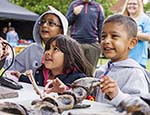 Action-packed activities on offer as Festival of Communities returns
Action-packed activities on offer as Festival of Communities returns16 May 2022
The annual Festival of Communities celebrates everything that makes east London a fantastic place to live and work. Hosted by Queen Mary University of London and Tower Hamlets community groups and organisations, the festival allows visitors to engage with exciting research through games, sports, crafts and other family friendly activities and events.
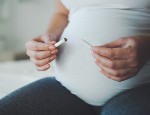 E-cigarettes may be more effective than nicotine patches in helping pregnant women who smoke quit, and are just as safe
E-cigarettes may be more effective than nicotine patches in helping pregnant women who smoke quit, and are just as safe16 May 2022
E-cigarettes are just as safe as nicotine patches for pregnant women and may help more women stop smoking, new research from Queen Mary University of London suggests. The study, which was published in Nature Medicine, is the first to examine the safety and efficacy of e-cigarettes among pregnant smokers.
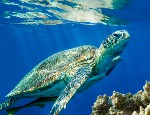 Queen Mary confirmed as leading research-intensive university
Queen Mary confirmed as leading research-intensive university 12 May 2022
Queen Mary University of London has excelled in today’s Research Excellence Framework (REF)1, confirming once again the University’s status as one of the best research-intensive universities in the UK.
 Professor Andrew Livingston elected a Fellow of the Royal Society
Professor Andrew Livingston elected a Fellow of the Royal Society10 May 2022
The Royal Society has elected Professor Livingston, Queen Mary’s Vice-Principal (Research and Innovation) and Professor of Chemical Engineering, as a new Fellow.

9 May 2022
Dr Olivia Keenan from Queen Mary's School of Physical and Chemical Sciences has co-written for The Conversation on removing barriers to girls’ participation in physics.
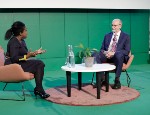 Vaccine expert Professor Sir Andrew Pollard discusses Covid-19 vaccination at Queen Mary event
Vaccine expert Professor Sir Andrew Pollard discusses Covid-19 vaccination at Queen Mary event9 May 2022
Professor Sir Andrew Pollard, a Queen Mary alumnus who leads the team responsible for developing the Oxford-AstraZeneca vaccine, spoke at the latest Alumni Angles series.
 Cost of living crisis means winter is already worrying Londoners, new Queen Mary research shows
Cost of living crisis means winter is already worrying Londoners, new Queen Mary research shows5 May 2022
Summer is just beginning but most Londoners already have concerns about heating their homes this winter, according to new research from Queen Mary University of London’s Mile End Institute that highlights the cost-of-living crisis unfolding in the capital.

4 May 2022
Dr Patrick Diamond, Reader in Public Policy at Queen Mary University of London, has written for The Conversation on the Mile End Institute's polling of the the 2022 local government elections in London.
 Unvaccinated individuals with heart problems up to 9 times more likely to die or suffer serious complications from COVID-19
Unvaccinated individuals with heart problems up to 9 times more likely to die or suffer serious complications from COVID-194 May 2022
Researchers from Queen Mary University of London have combined evidence from 110 previous Covid-19 studies and found that unvaccinated individuals who contract the virus when they already have high blood pressure, diabetes or major heart damage are up to nine times more likely to suffer serious outcomes - including death, lung failure, admission to intensive care and kidney problems.
 1 in 10 WhatsApp messages are spam
1 in 10 WhatsApp messages are spam29 April 2022
New research has found that 1 in 10 WhatsApp messages are spam – with clickbait, adult content, and hidden URLs being the most common.
 Queen Mary academic awarded €2.3m to investigate how planets are formed from dust
Queen Mary academic awarded €2.3m to investigate how planets are formed from dust27 April 2022
Dr Sijme-Jan Paardekooper from the School of Physical and Chemical Sciences has been awarded € 2,314,680 from the European Research Council (ERC) to study how dust distribution impacts the formation of planets. He is one of 253 leading researchers across Europe who have been awarded funding in the ERC's 2021 Advanced Grants competition.
 Queen Mary academic wins Global Challenges Teaching Award
Queen Mary academic wins Global Challenges Teaching Award27 April 2022
Dr Jonathan Kennedy from the Wolfson Institute of Population Health, part of Queen Mary's Faculty of Medicine and Dentistry, has won an award in the 'Pandemics' category of the US-UK Fulbright Commission's inaugural Global Challenges Teaching Awards (GCTA), a programme aimed at increasing access to global learning for students on either side of the Atlantic.
 Scientists to trial world-first long-acting injection for high blood pressure
Scientists to trial world-first long-acting injection for high blood pressure27 April 2022
Scientists from Queen Mary University of London and Barts Health NHS Trust are trialling an investigational medication for high blood pressure (hypertension) in a clinical study which will give patients an injection of the medication every 6 months.

26 April 2022
Eric Heinze, Professor of Law at Queen Mary University of London has written for The Conversation on Elon Musk's takeover of Twitter and the debate around free speech.
 Largest ever survey of exoplanet atmospheres reveals mysteries of 'hot Jupiters'
Largest ever survey of exoplanet atmospheres reveals mysteries of 'hot Jupiters'26 April 2022
Hot Jupiters are giant gas exoplanets - 'alien' planets only found outside our own solar system. They have a short (10 day or less) orbital period around their parent stars.

22 April 2022
Professor Parvati Nair from Queen Mary's School of Languages, Linguistics and Film has written for The Conversation on the UK's Rwanda asylum seeker policy.

22 April 2022
Professor Rainbow Murray from Queen Mary's School of Politics and International Relations has written for The Conversation on the upcoming French elections.
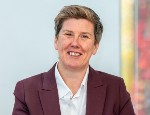 New Humanities and Social Sciences VP for Queen Mary
New Humanities and Social Sciences VP for Queen Mary22 April 2022
Queen Mary University of London has appointed Professor Frances Bowen as its new Vice-Principal for Humanities and Social Sciences, following an extensive international search.
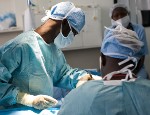 Queen Mary team awarded funding for research project to improve post-surgical outcomes in Africa
Queen Mary team awarded funding for research project to improve post-surgical outcomes in Africa19 April 2022
A team of Queen Mary and African researchers have successfully secured almost £3 million in funding for a new research programme led by Queen Mary’s Professor Rupert Pearse and Professor Bruce Biccard from the University of Cape Town, South Africa.
 Queen Mary academic awarded funding to become an ICT public engagement champion
Queen Mary academic awarded funding to become an ICT public engagement champion8 April 2022
Professor Paul Curzon from the School of Electronic Engineering and Computer Science has been awarded £162,000 from the Engineering and Physical Sciences Research Council to boost public engagement with ICT.

4 April 2022
Áine Clancy, PhD Candidate in the School of Law at Queen Mary University of London has written for The Conversation on the changes in law to prevent the spread of dirty money.

4 April 2022
Dr Jessica Potter from Queen Mary's Faculty of Medicine and Dentistry has co-written for The Conversation on Russia's invasion of Ukraine threatening the fight against tuberculosis.
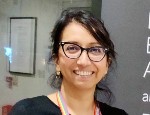 Professor Arunthathi Mahendran appointed as the Institute Director for IHSE
Professor Arunthathi Mahendran appointed as the Institute Director for IHSE30 March 2022
As the new Institute Director for the Institute of Health Sciences Education (IHSE) at Queen Mary, Arunthathi brings a wealth of expertise and knowledge.
 New report calls for personalised testing for safety and effectiveness of common medicines throughout the NHS
New report calls for personalised testing for safety and effectiveness of common medicines throughout the NHS29 March 2022
Testing patients for genetic variations that affect how their body will respond to common medicines must be integrated fully, fairly and swiftly into the NHS, according to a report published today. The report is by the British Pharmacological Society, whose President-elect is Queen Mary University of London’s Vice Principal for Health Professor Sir Mark Caulfield, and the Royal College of Physicians. Dr Emma Magavern, a clinician at Queen Mary, is also one of the report’s co-authors.
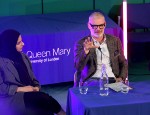 Queen Mary officially launches its Digital Environment Research Institute
Queen Mary officially launches its Digital Environment Research Institute25 March 2022
Queen Mary has announced the official launch of its Digital Environment Research Institute (DERI) at an exclusive event - Towards 2030: Realising the UK's AI ambitions - on the 24th March.
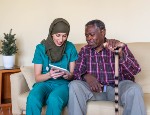 Queen Mary researcher receives funding to investigate the impact of long COVID within ethnic minority groups
Queen Mary researcher receives funding to investigate the impact of long COVID within ethnic minority groups25 March 2022
Dr Dipesh Gopal from Queen Mary University of London’s Faculty of Medicine and Dentistry will be involved in a £119,634 project that will reveal the lived experiences of people with long COVID specifically in ethnic minority groups.
 Queen Mary ranks top of the Russell Group in new social mobility index
Queen Mary ranks top of the Russell Group in new social mobility index24 March 2022
The English Social Mobility Index for 2022, published by the Higher Education Policy Institute (HEPI), ranks Queen Mary as the best Russell Group university for social mobility and third best in the country overall for a second successive year.
 Queen Mary alumni celebrate diverse legal achievements
Queen Mary alumni celebrate diverse legal achievements24 March 2022
Meet the winners of our Centre for Commercial Law Studies (CCLS) Alumni Awards, which shine a light on some of those who chose Queen Mary for their postgraduate legal education.
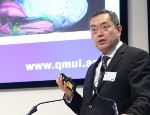 Queen Mary academic appointed as Research Chair to help solve economic and environmental challenges through computer-manipulated materials
Queen Mary academic appointed as Research Chair to help solve economic and environmental challenges through computer-manipulated materials24 March 2022
Professor Yang Hao from Queen Mary University of London has been appointed as the prestigious Royal Academy of Engineering’s Research Chair.
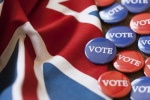 New research highlights issues with Londoners’ quality of life, trust in the Met and attitudes to Covid
New research highlights issues with Londoners’ quality of life, trust in the Met and attitudes to Covid 24 March 2022
Londoners are generally pessimistic about life in the capital, according to new research from the Mile End Institute at Queen Mary University of London ahead of local elections in May. Polling revealed serious trust issues around the police force, with most saying the Met is racist and sexist – and also around Covid, with many hesitant or complacent about vaccination and social distancing.

22 March 2022
Professor Michael Pluess from Queen Mary's School of Biological and Behavioural Sciences has co-written for The Conversation on how genetics impacts therapy and similar relationship courses.
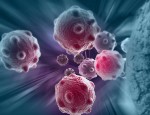 New PCR test for oral cancer set to revolutionise diagnosis and treatment
New PCR test for oral cancer set to revolutionise diagnosis and treatment21 March 2022
qMIDS, the world’s first rapid oral cancer test, has been developed by Queen Mary University of London and an international team of researchers. It has the potential to relieve pressure on the NHS and may improve the early detection of oral cancer.

21 March 2022
Professor Julia Hörnle, Chair of Internet Law at Queen Mary's Centre for Commercial Law Studies, has written for The Conversation about whether the UK Government's Online Safety Bill can really curb digital harms.
-150.png) Queen Mary academic wins major funding for European ‘rising stars’
Queen Mary academic wins major funding for European ‘rising stars’17 March 2022
A Queen Mary academic has risen to the top of thousands of proposals to win a prestigious European Research Council (ERC) Consolidator Grant worth €2m as part of the EU’s new R&I programme Horizon Europe.
 British South Asian genetic study reaches record volunteer numbers
British South Asian genetic study reaches record volunteer numbers15 March 2022
Genes & Health study, a project led by Queen Mary University of London, has hit a key milestone with 50,000 research volunteers now participating nationally to help address the under-representation of South Asian communities in genetic research.
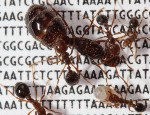 Scientists find new colony structure of fire ants evolved in one species before spreading to others
Scientists find new colony structure of fire ants evolved in one species before spreading to others11 March 2022
Scientists from Queen Mary University of London have discovered that a new form of ant society spread across species. They found that after the new form of society evolved in one species, a “social supergene” carrying the instruction-set for the new social form spread into other species. This spread occurred through hybridisation, i.e., breeding between ants of different species. This unlikely event provides an alternate way of life, making the ants more successful than if they only had the original social form.
 DeepMind academic fellow joins Queen Mary University of London
DeepMind academic fellow joins Queen Mary University of London10 March 2022
Rendani Mbuvha, a promising Actuary & Machine Learning Researcher, joins Queen Mary as the DeepMind Academic Fellow in Machine Learning from the University of the Witwatersrand in South Africa.
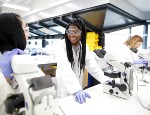 Queen Mary’s gender equality work retains prestigious accolade
Queen Mary’s gender equality work retains prestigious accolade9 March 2022
Queen Mary University of London has successfully retained its Institutional Athena Swan Silver Award, in recognition of the University’s commitment to advancing gender equality.
 Queen Mary awarded funding for new healthy ageing networks
Queen Mary awarded funding for new healthy ageing networks8 March 2022
Researchers from Queen Mary University of London have been selected by UK Research and Innovation (UKRI) to create new networks aimed at transforming ageing research in the UK.
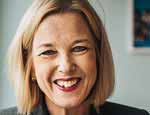 Professor Stephanie Marshall joins expert European committee on learning and teaching
Professor Stephanie Marshall joins expert European committee on learning and teaching8 March 2022
Queen Mary University of London’s Vice-Principal (Education), Professor Stephanie Marshall, has been appointed to the prestigious European University Association (EUA) Learning & Teaching Steering Committee.
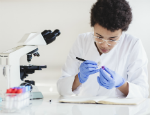 Queen Mary and Barts Health Trust awarded new funding for early-stage clinical research
Queen Mary and Barts Health Trust awarded new funding for early-stage clinical research7 March 2022
Queen Mary University of London and Barts Health NHS Trust have received £1 million in funding from the National Institute for Health Research (NIHR) to integrate five Clinical Research Facilities (CRFs) and 18 disease-specific research groups into a combined CRF team. The team will operate at various sites within Barts Health NHS Trust and Queen Mary University of London across east London.
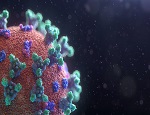 Genetic study gives extensive insights into severe Covid-19
Genetic study gives extensive insights into severe Covid-197 March 2022
Queen Mary University of London has contributed to the world’s largest study of the genetics of critical Covid-19, involving more than 57,000 people, and revealed fresh details about some of the biological mechanisms behind the severe form of the disease.
 Queen Mary academics elected to the Academy of Social Sciences
Queen Mary academics elected to the Academy of Social Sciences7 March 2022
Three members of Queen Mary’s Faculty of Humanities and Social Sciences (HSS) have been awarded prestigious Fellowships by the Academy of Social Sciences (ACSS) in recognition of their excellence and impact, including for wider contributions to social sciences for public benefit.
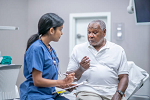 New early signs of Parkinson’s uncovered in most diverse UK study to date
New early signs of Parkinson’s uncovered in most diverse UK study to date 7 March 2022
Hearing loss and epilepsy are early features of Parkinson’s, according to pioneering new research from Queen Mary University of London – the first UK study of the condition in such a diverse population, published today in JAMA Neurology.
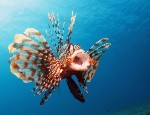
3 March 2022
Dr Axel Rossberg, Reader in Theoretical Ecology at Queen Mary University of London has written for The Conversation on why predators don't overexploit their prey, based on research published in Ecology Letters.
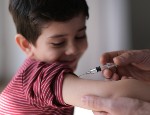
2 March 2022
By Carol Dezateux, Professor of Clinical Epidemiology and Health Data Science at the Clinical Effectiveness Group (CEG), Queen Mary University of London
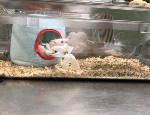 New research in mice suggests social interactions and a sense of belonging can boost our immune system
New research in mice suggests social interactions and a sense of belonging can boost our immune system1 March 2022
Researchers from Queen Mary University of London have found that socially housed mice have healthier immune systems than those who are socially isolated – who are more susceptible to longer term issues due to an altered immune system that comes from living alone.
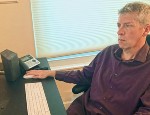 Queen Mary’s Professor Joshua Reiss appointed Entrepreneur in Residence for Science, Engineering and Technology
Queen Mary’s Professor Joshua Reiss appointed Entrepreneur in Residence for Science, Engineering and Technology24 February 2022
Professor Reiss will work to strengthen entrepreneurship and commercial impact across Queen Mary in fields such as AI, Computer Science and Electrical Engineering.
 Greece accused of violating European citizen rights and forcing people fleeing persecution back across the border in landmark legal case
Greece accused of violating European citizen rights and forcing people fleeing persecution back across the border in landmark legal case24 February 2022
An unprecedented legal application has been submitted at the European Court of Human Rights, challenging the racially motivated pushback of a French citizen from EU territory. Prof Violeta Moreno-Lax, from the School of Law at Queen Mary University of London, is providing legal representation alongside a team of international lawyers.
 New approach to traumatic brain injuries could revolutionise diagnosis and treatment
New approach to traumatic brain injuries could revolutionise diagnosis and treatment23 February 2022
New research led by Queen Mary University of London and Barts Health NHS Trust suggests that biochemical analysis of brain tissue could be used for diagnosis and prognosis of severe traumatic brain injury (TBI) to improve patient outcomes and save billions in future clinical trials.

22 February 2022
Daniele Bianchi, Associate Professor of Finance at Queen Mary University of London, has written for The Conversation on how financial markets are affected by wars and other political events.

21 February 2022
Iain Nash, PhD researcher at Queen Mary's Centre for Commercial Law Studies, has written for The Conversation on how smart devices can present security risks.
 Delayed US sodium targets may cost 250,000 lives
Delayed US sodium targets may cost 250,000 lives21 February 2022
Last October, the U.S. Food and Drug Administration (FDA) finalised a set of short-term, voluntary goals for lowering salt levels in foods—five years after they were proposed in 2016. A new study published today in Hypertension—a journal published by the American Heart Association – involving Queen Mary University of London researchers shows the delay cost thousands of lives and concluded that if the food and restaurant industries would have adopted the lower salt levels presented in FDA’s proposed two-year and 10-year targets on schedule, as many as 265,000 lives could have been saved between 2017 and 2031.
 Project protecting online privacy for people going through serious life events secures major funding
Project protecting online privacy for people going through serious life events secures major funding17 February 2022
Protecting people from stalking, online trolls, and other serious online dangers they are exposed to when going through serious real-life events is the focus of a major new £3.44 million project involving Queen Mary University of London researchers. It is funded by the Engineering and Physical Sciences Research Council.
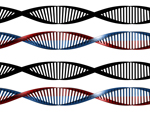 Whole genome sequencing robustly detects the most common inherited neurological diseases and is adopted by healthcare
Whole genome sequencing robustly detects the most common inherited neurological diseases and is adopted by healthcare 17 February 2022
Scientists have found whole genome sequencing (WGS) can quickly and accurately detect the most common inherited neurological disorders – something previously thought to be impossible – with the results supporting the use of WGS as a standard diagnostic tool within routine clinical practice.
 Queen Mary alumnus on the road to becoming an astronaut
Queen Mary alumnus on the road to becoming an astronaut16 February 2022
Dr Fabian Hualca-Tigsilema, who graduated from Queen Mary University of London in 2014, was accepted as a European Space Agency (ESA) astronaut candidate last year and has now completed the first of five required phases of assessment.

15 February 2022
By Andrew Livingston
Since I joined Queen Mary in 2019, I have been both excited and fascinated to learn about all of the fantastic research we undertake at Queen Mary, across all three of our faculties. There is no doubt that we are a world-leading research-intensive University.
 Queen Mary researchers join group in search for gravitational waves
Queen Mary researchers join group in search for gravitational waves11 February 2022
A team of researchers from the Astronomy Unit in the School of Physical and Chemical Sciences at Queen Mary University of London have been admitted to the LIGO Scientific Collaboration, the global organisation leading the detection and interpretation of gravitational wave events.
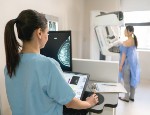 New study suggests changing breast screening programme timelines would increase detected cases and uptake
New study suggests changing breast screening programme timelines would increase detected cases and uptake11 February 2022
A new study led by Queen Mary University of London, published in the Journal of Medical Screening, has found that using a longer interval between screens but a higher uptake in the NHS screening programme for breast cancers could detect more cancers early than with the current interval and uptake rates. For example, a four year interval with 62% uptake would lead to 295 screen detected cancers per 10,000 invited, compared with 222 cancers with a 3-year round.
 New research shows ethnicity and deprivation are independently associated with dementia risk
New research shows ethnicity and deprivation are independently associated with dementia risk11 February 2022
People from ethnic minority groups and socioeconomically deprived areas face higher risks of developing dementia, according to new research from Queen Mary University of London published today in The Lancet Regional Health Europe.
 New research shows that children can play an important role in lowering families’ salt intake
New research shows that children can play an important role in lowering families’ salt intake
10 February 2022
A new study published in The BMJ and carried out by researchers funded by the National Institute for Health Research (NIHR) at Queen Mary University of London and The George Institute for Global Health at Peking University Health Science Center, has shown that schoolchildren can help their families to successfully reduce salt intake via smartphone app-based learning.
 New study shows light-to-moderate coffee consumption is associated with health-benefits
New study shows light-to-moderate coffee consumption is associated with health-benefits 10 February 2022
The study by Queen Mary University of London and the Budapest Semmelweis University has shown that having up to three cups of coffee a day is associated with a protective effect on heart health. It is also associated with a reduction in the overall mortality rate and the risk of stroke. The results have recently been published in the European Journal of Preventative Cardiology.
 New drug combination for aggressive breast cancer could save thousands of lives
New drug combination for aggressive breast cancer could save thousands of lives10 February 2022
An immunotherapy drug called ‘pembrolizumab’ has been shown to significantly reduce disease recurrence in patients with the most aggressive type of breast cancer, according to results from a phase III clinical trial led by Queen Mary University of London and Barts Health NHS Trust.
-150.jpg) New study pinpoints bumblebee genes that help them adapt to environmental changes
New study pinpoints bumblebee genes that help them adapt to environmental changes 9 February 2022
Researchers from Queen Mary University of London and Imperial College London have identified genes that could help bumblebees overcome environmental challenges such as climate change.
 Queen Mary celebrates Apprenticeship Week with another record-breaking year
Queen Mary celebrates Apprenticeship Week with another record-breaking year 7 February 2022
Over the past five years, there has been a substantial rise in the number of degree apprenticeship programmes offered at Queen Mary. We are also attracting a record number of apprentices. The data comes during National Apprenticeship Week, a week-long celebration highlighting the benefits apprenticeships can have for individuals, businesses and local communities.
 Professor Sir Mark Caulfield appointed VP Health at Queen Mary and President-elect of the British Pharmacological Society
Professor Sir Mark Caulfield appointed VP Health at Queen Mary and President-elect of the British Pharmacological Society3 February 2022
The British Pharmacological Society has announced the appointment of Queen Mary University of London’s Professor Sir Mark Caulfield as its new President-elect.
 Genetic study suggests more sensitive people respond better to couple’s therapy
Genetic study suggests more sensitive people respond better to couple’s therapy 2 February 2022
How well someone responds to couple’s therapy could be determined by their genes, according to a new study led by Queen Mary University of London and the University of Denver.
 Comparing preprints and their finalized publications during the pandemic
Comparing preprints and their finalized publications during the pandemic2 February 2022
A new study involving Queen Mary University of London researchers has explored how preprints compare with their published versions.
 New Queen Mary research project aims to advance early cancer diagnosis in Africa
New Queen Mary research project aims to advance early cancer diagnosis in Africa 2 February 2022
Researchers from Queen Mary University of London have been awarded £3 million funding from the National Institute for Health Research (NIHR) to encourage earlier cancer diagnosis in Southern Africa.
 Global oral health expert Professor Manu Raj Mathur joins Queen Mary University of London
Global oral health expert Professor Manu Raj Mathur joins Queen Mary University of London 1 February 2022
Professor Manu Raj Mathur will join Queen Mary University of London’s Centre for Dental Public Health and Primary Care on 1 February 2022 as Professor of Dental Public Health.
 Queen Mary alumnus launches new mental health app
Queen Mary alumnus launches new mental health app27 January 2022
Dr Nick Prior, NHS psychiatrist and former student at Queen Mary University of London has launched the ‘Minderful’ app to make mental fitness accessible and engaging.
 Scientists develop Covid-19 testing lab in a backpack
Scientists develop Covid-19 testing lab in a backpack26 January 2022
Researchers have created a simple Covid-19 testing lab that fits into a backpack providing a cheap and effective solution for low income or remote areas.
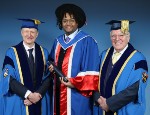 Honorary degrees presented at Queen Mary Graduation
Honorary degrees presented at Queen Mary Graduation26 January 2022
Three honorary degrees were awarded during January’s graduation, marking the awardees’ invaluable contributions to the fields of engineering, political journalism and law. Queen Mary congratulates this year’s recipients for their successes and service to others.
 1 in 4 Chilled Sliced Meats Sold in the UK are Saltier than Atlantic Seawater, according to new data
1 in 4 Chilled Sliced Meats Sold in the UK are Saltier than Atlantic Seawater, according to new data25 January 2022
New research by Action on Salt from Queen Mary University of London has revealed that two-thirds of all chilled sliced meats including sliced ham, chicken, corned beef and salami sold by leading grocery retailers are dangerously high in salt – with one in three failing to meet the national salt reduction targets.
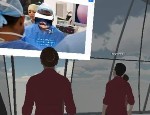 Queen Mary students receive first lecture in the metaverse
Queen Mary students receive first lecture in the metaverse19 January 2022
A group of Queen Mary third year medical students received the lecture in the virtual reality (VR) world, led by Professor Shafi Ahmed.
 Professor Sir Jonathan Van-Tam answers Covid-19 questions at Queen Mary event
Professor Sir Jonathan Van-Tam answers Covid-19 questions at Queen Mary event18 January 2022
Queen Mary’s Institute of Dentistry recently hosted a virtual Q&A session with England’s Deputy Chief Medical Officer, Professor Sir Jonathan Van-Tam.

14 January 2022
Professor Brigitte Granville from Queen Mary's School of Business and Management has written for The Conversation on banks' efforts to tackle inflation.
 Queen Mary signs significant cooperation agreement with the Polytechnic Foundation of the National Polytechnic Institute
Queen Mary signs significant cooperation agreement with the Polytechnic Foundation of the National Polytechnic Institute14 January 2022
Queen Mary University of London has signed a landmark agreement with the Polytechnic Foundation of the National Polytechnic Institute (IPN), Mexico. Covering 18 initiatives – from fully funded scholarships to CPD courses and dual postgraduate degrees – the partnership will further strengthen the relationship between the institutions.
 Optimising treatments for high blood pressure and cardiovascular disease could save lives, according to researchers
Optimising treatments for high blood pressure and cardiovascular disease could save lives, according to researchers 14 January 2022
A recent study shows that optimising medicines for high blood pressure and cardiovascular disease patients living in East London could reduce lifetime hospital costs and prevent cardiovascular events such as heart attacks and strokes.
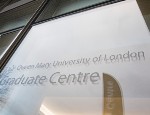 Queen Mary partners with Goldman Sachs for new degree apprenticeship
Queen Mary partners with Goldman Sachs for new degree apprenticeship 13 January 2022
Queen Mary University of London and Goldman Sachs are launching a new Global Markets degree apprenticeship, offering students a chance to gain four years of work experience at a world-leading investment firm and a degree from one of the world’s leading research-intensive universities. Those accepted will join September 2022.
 Eminent materials scientist joins Queen Mary
Eminent materials scientist joins Queen Mary10 January 2022
Professor Sir Harshad "Harry" Kumar Dharamshi Hansraj Bhadeshia, the Indian-British metals expert is joining Queen Mary University of London.
 DNA from air could revolutionize the way we measure animal biodiversity, say scientists
DNA from air could revolutionize the way we measure animal biodiversity, say scientists6 January 2022
Two new studies published today in the journal Current Biology show that environmental DNA (eDNA) collected from air can be used to detect a wide range of animal species and offers a novel, non-invasive approach to monitoring biodiversity.
 Graphene could replace rare metal used in mobile phone screens
Graphene could replace rare metal used in mobile phone screens6 January 2022
A new study, published in the journal Advanced Optical Materials, is the first to show graphene can replace Indium Tin Oxide (ITO) in an electronic or optical device.
 Queen Mary alumna completes incredible expedition to the South Pole
Queen Mary alumna completes incredible expedition to the South Pole6 January 2022
Captain Preet Chandi, a Queen Mary University of London alumna, travelled 700 miles in just 40 days, capping a remarkable achievement.
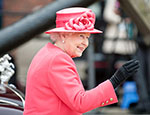 Queen Mary staff recognised in the New Year Honours List
Queen Mary staff recognised in the New Year Honours List1 January 2022
Congratulations to Queen Mary colleagues on their awards published in the latest New Year Honours List.